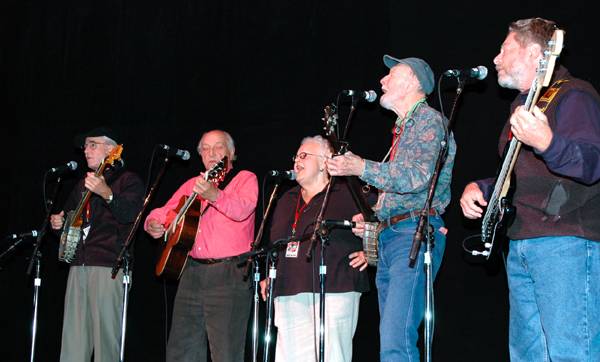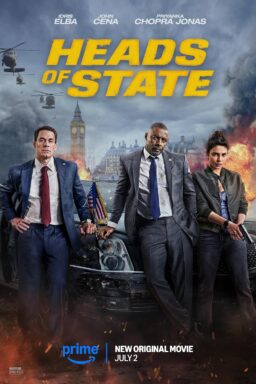TORONTO — Pete Seeger was standing in the corner of the big dressing room, playing a tune on his recorder. Fred Hellerman was planted on a chair, listening. “It’s an old Japanese air,” Seeger said, putting down his recorder.
“I’ve heard you play a whole opera on that thing,” Hellerman said.
This was last week at the Toronto Film Festival, where the Weavers were going to sing that night for probably the last time. Three of them — Seeger, Hellerman and Ronnie Gilbert — go back more than 55 years together, and their songs are like the American national soundtrack. Think of “Goodnight, Irene,” “Wimoweh,” “This Land Is Your Land,” “If I Had a Hammer,” “Midnight Special” and “Rock Island Line,” and it’s their voices you hear in your memory.
Pete Seeger is now 85. Ronnie Gilbert and Fred Hellerman are pushing 80. Lee Hays, the fourth member of the original group, died in 1981. Erik Darling and Eric Weissberg have joined the group for reunions since then, and now all five gathered for a conversation before their rehearsal.
The occasion was the premiere that evening of Jim Brown’s “Isn't This a Time!,” a documentary about a Carnegie Hall concert in honor of Harold Leventhal’s 50th anniversary as an impresario. It was Leventhal who booked them into Carnegie Hall the first time in the late 1940s, and Leventhal who reunited them a few years later at the height of McCarthyism, when the group’s left-wing politics had made them victims of a show business blacklist. In between, they’d had a No. 1 hit with Leadbelly’s song “Goodnight, Irene,” become the most popular singing group in the country and then faced oblivion because of the blacklist.
Seeger, heir to his friend Woody Guthrie as the nation’s folk troubadour, retired from touring a few years ago, claiming his voice was gone. He agreed to the Carnegie Hall concert because it honored Leventhal. “Because of Harold,” Hellerman said, “we became the Weavers.”
The film shows Seeger and the others in joyous voice at a concert also featuring Arlo Guthrie, Theo Bikel, Leon Bibb and Peter, Paul and Mary.
“But we didn’t feel we were necessarily at our best,” Hellerman said. So the Weavers were a little apprehensive about how it would go after the movie tonight, when they planned “not a concert — more of a nightcap, three or four songs.”
“They claim they only have four songs they’ve rehearsed enough to play publicly,” Michael Cohl said, grinning. He’s the co-producer of the film and a concert promoter whose acts include the Rolling Stones — and, when he can persuade them, the Weavers. “Rehearsal means they sing each of the four songs twice, and then they sit around for hours singing every other song they know, and they all sound great.”
“The empty seat is for Lee Hays,” Seeger said as the group settled down to talk. Hays died shortly after the filming of “The Weavers: Wasn’t That a Time” (1982), also directed by Brown, the great musical documentary about their farewell concert at Carnegie Hall. This time, it looked like farewell for good.
They started out talking about the origins of “peoples’ songs,” which came from folk, labor, spiritual and country roots. No, they never played the Grand Ol’ Opry as a group, but they listened. “I remember,” said Ronnie Gilbert, “a song called ‘What Kind of Fool Would Steal 29 Books of Green Stamps?’ It was a woman complaining about her man. I didn’t believe it, because no country woman would ever turn her guy in to the police.”
“Remember the old joke,” said Hellerman, “about when you play the country record backwards, he gets his wife back and repossesses the truck?”
I said my friend Studs Terkel tells a story about how Seeger and Woody Guthrie and some other singers needed a place to stay for a few nights in Chicago, and Studs sent them home to his wife Ida with a note saying they were good guys and could sleep on the floor.
“That was in 1940,” Seeger said. “We slept there for three nights. There were two rooms, including a kitchen. It got a little crowded. Not long ago my wife Toshi and I had our 12-year-old grandchild in a taxi with Studs, and in 15 minutes, Studs had the taxi driver’s entire life story.”
Seeger said the beginning of the Weavers was probably in 1940, when he and Lee Hays and Woody Guthrie formed the Almanac Singers to perform union songs. “We rehearsed right on the stage,” he said, “arguing about who was going to sing the next verse. After the war, Lee said, ‘Let’s get another group and actually rehearse.'”
The 1982 documentary tells the story of the Weavers’ rise and fall and rise, and how they overcame McCarthyism to become one of the best-selling groups of the decade. They were the key inspiration for the 1960s folk singers who fueled the civil rights and antiwar movements, including Peter, Paul and Mary, whose hit “If I Had a Hammer,” was co-written by Seeger and Hays.
“Yesterday,” Ronnie Gilbert said, “somebody asked us, ‘Did you change the world?’ Maybe you can’t change the world. But you can keep trying.”
“Why don’t you do one last concert tour?” I asked them.
“In 1980, it was very easy for us, like riding a bicycle,” Hellerman said. “That’s not true today. We live all over the country, and we all have our own causes and interests.”
Do you know what songs you’re going to sing tonight?
He laughed. “We’ve known for 40 years.”
That night, the movie electrified the huge Elgin theater here; the audience sang along, clapped in rhythm and applauded each song as if it had been live.
Then the Weavers came onstage and opened with “When the Saints Go Marching In,” and I looked over the audience and saw people cheering and crying at the same time. They were in great voice — “a lot better than Carnegie Hall,” Eric Weissberg told me later. They sang “My Mother’s House Was Filled With Music” and “Wimoweh,” and for an encore, they sang “Goodnight, Irene.”
And Ronnie Gilbert stepped up to the mike and urged the Americans in the audience to vote for John Kerry, and told them, “You can change the world.”
Maybe songs can change things. Seeger explains “Wimoweh” in the movie: It’s a South African song from the 1940s, and the lion that sleeps in the jungle represents the Africans of South Africa, who would rise up and overthrow apartheid. Around the edge of Seeger’s banjo are written these words: “This machine surrounds hate and forces it to surrender.”
The next morning I joined Michael Cohl and his cousin Dusty, the founder of the film festival, at their Saturday morning coffee ritual.
“The Weavers have sung together for the last time,” said Michael.
“Unless — one thing. Unless John Kerry would like them to do some concerts for his campaign. They’ve agreed they would do that.”
So perhaps it is too soon to envision the Weavers going their separate ways, singing perhaps Guthrie’s “So Long, It’s Been Good to Know You.” Perhaps they will walk onto a stage yet once again to remind us, also in Guthrie’s words, that this land is our land.
“There’s a kind of eerie moment in the movie,” I said to Seeger before the rehearsal, “when Arlo Guthrie observes that he has now performed with you twice as long as his father did.”
“Time,” said Pete Seeger. “Time, time. A beautiful mystery.”
Fred Hellerman smiled and said, “At least it keeps everything from happening at once.”












